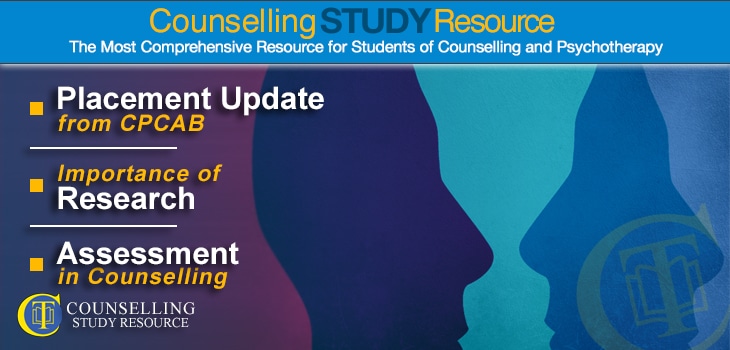171 - Assessment in Counselling
Placement Update from CPCAB - Importance of Research
In episode 171 of the Counselling Tutor Podcast, Rory Lees-Oakes talks to Kelly Budd of CPCAB about student placements during the COVID-19 pandemic. Then, in 'The Digital Counselling Revolution', Rory and Ken Kelly discuss the importance of research in counselling.
Last, 'Practice Matters' looks at assessment in counselling, the topic of a new lecture available here in Counsellor CPD.
Placement Update from CPCAB (starts at 1.00 mins)
Rory talks to Kelly Budd, Head of Qualifications at the Counselling and Psychotherapy Central Awarding Body (CPCAB), about student placements during the COVID-19 pandemic.
This has been a highly challenging time for counselling students, who have faced difficulties both in finding a placement and in keeping this, with many agencies closing during lockdowns.
Kelly notes that - while CPCAB can make decisions itself on exam design, course assessment and training delivery, the placement part of the qualification is less directly in its control.
Kelly has therefore written a letter to placement providers, pointing out the skills offered by CPCAB student counsellors and the support for them that is in place through CPCAB.
The idea is that students can use this when approaching counselling agencies, and that this will support them secure a good placement.
You can find out more about CPCAB and its response to the COVID-19 situation on its website. CPCAB is the UK's only awarding body run by counsellors for counsellors.
Importance of Research (starts at 12.35 mins)
Online and telephone counselling has grown hugely since the COVID-19 pandemic began.
While there is already a research base suggesting that it can be just as effective, and may even be preferred by some clients (e.g. those for whom travelling to face-to-face therapy is difficult), Rory predicts that there will be more and more research into this increasingly important way of delivering counselling.
Research matters in counselling as it helps ensure that we provide the best possible service for clients - and that we refer them on to other more suitable support if that is what's best for their presentation.
Ken reminds us that Carl Rogers's view was that the facts are always friendly: in other words, it's always better to know than not to know. So do make sure that you keep up-to-date with research on this growing way to deliver therapy.
Rory has written a handout on the importance of research, which you can download here. And our course, Online and Telephone Counselling, covers the topic of research on online and telephone therapy in more detail.
Assessment in Counselling (starts at 21.35 mins)
Just as being au fait with the latest research is important, so thorough client assessment is also needed in order to be able to deliver a high-quality service for counsellors.
While assessment is sometimes painted as being not in keeping with the person-centred approach, it does not need to be seen as a hard-edged clinical technique.
In fact, assessment in counselling helps you to check that the client is able and willing to engage with therapy, that your competence level and area matches the client's needs, and whether there are any areas of risk that you need to consider.
Rory considers that assessment has always taken place as part of person-centred counselling: it might just not always have been called this.
There may be differences between therapeutic modalities - e.g. the person-centred approach, transactional analysis (TA), cognitive behavioural therapy (CBT) and psychodynamic therapy - in what exactly is covered and asked in assessment.
Assessment may be redone as part of a counselling review, and this can also be really valuable for clinical supervision - providing material to present to your supervisor that illustrates progress of the therapy.
To find out more about assessment in counselling, you may like to consider watching the specialist lecture on this highly important topic available here.
This is presented by counsellor and trainer Emma Chapman, who gives you an understanding of the pros and cons of using assessments in counselling, and the opportunity to explore different assessment tools.


